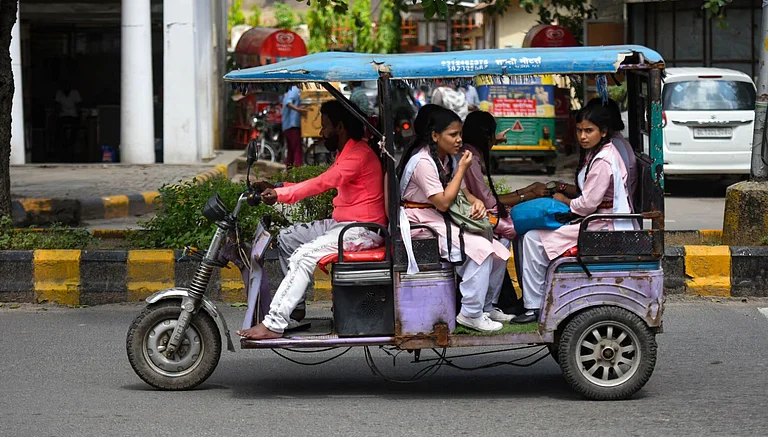Business in Russia seems fraught with the same chaos and uncertainty. It takes a strong stomach to be persuaded to test the waters, which is perhaps why even after three years and many visits, it is only our proverbial toes that are still wet. Not that setting up a trading house there is difficult. The formalities are simple. Indian manpower is aplenty, scores of ex-students, engineers, physicists and doctors, who after long stints of study there are also familiar with the language and social mores, and are eager to try their hands at commerce. It was with one such, an individual who had a decade ago joined Patrice Lumumba University for mechanical engineering, that we were tentatively thinking of a business partnership.
To conduct business in Russia, he tells me, it is essential to parlay with the mafia. There is a diversity of such outfits in Russia—Armenian, Chechen, Georgian, ethnic Russian and even a small, tightly-knit Indian one in the city of St Petersburg. The Georgian variety are the ones with whom he fixes me a conference. As our vehicle meets up with a car at a designated petrol station close to Red Square, the butterflies flutter with increasing vigour in my stomach. A rather nattily dressed gentleman hops into our vehicle (the interpreter, I learn later), and we follow the lead car on a long ride to the outer suburbs of Moscow. I peer out nervously at the bleak October countryside as the apartment blocks thin out and the dachas start to appear. "Where are they taking us?" I whisper to my companion sitting beside me. "Not to worry," he tells me. Almost 40 minutes later we turn into a small township and stop outside a three storeyed building. The place looks dilapidated, the walkway is cracked, with weeds creeping out of the crevices. My trepidation increases.
Our escort leads us through the front door and we climb up ramshackle stairs in gloomy afternoon light that streams in from a ventilator. We halt at the door on the first floor and a bell is sounded. A swarthy man in a pale green jacket and bright yellow tie opens the door, nods at our escort, grunts a couple of words in Russian and lets us in.
The insides of the building dazzle, in contrast to its exterior. Panelled wood, concealed lighting, modern furniture and soft carpeting. We are escorted to a well-appointed meeting room. Soon the big chief comes in, a smiling, pleasant-faced person of medium build with thick dark hair and a walrus moustache. Conversation is cheerful and civilised, over well-brewed cups of tea. Petroleum and steel is what is on offer. "We will arrange everything," the dons inform me. What disconcerts me is the heavy who had opened the door for us who, having seated himself in a far corner of the room, peers intently at us through cold grey eyes. As we go down the stairs on our way out, the interpreter whispers loudly "Ex-KGB!" which is apparently what the core of most racketeering groups is formed from.
The myriad images of Russia that remain with me still jolt, for they mostly emanate from a comprehensive breakdown of institutions, systems, culture and traditions. And this is itself the result of the sudden unbinding of a society and people subjected to decades of living under the unblinking eyes of an alert big brother. The woman bureaucrat from the Ministry of Health who, after dismissing the possibility of sourcing pharmaceutical formulations from India, suddenly switches tack and enquires whether anything would be available in the nature of stock for the 'sexshop' she plans to set up. The plush yacht casino moored on the Moskva river, its roulette table manned by a black Yank croupier with a distinct Southern accent. The waiter at the Georgian restaurant serving us who, standing at our table with a laden tray, gracefully slides all of it on the carpeted floor, the result of vodkas clandestinely imbibed through the evening. The pathos of the dozens of stunning young girls who throng the hotel lobby each evening, smiling invitingly as I walk past. The taxi driver, a stately old man with a shock of elegant white hair, who turns out to be a professor of physics in search of badly-needed extra income. Some lighter moments too, as with the caricaturist commissioned by the wife of an Indian diplomat to paint me, and as I stand self-consciously, the crowd that gathers behind the artist's easel erupts into hoots of laughter, making me wonder what he is making of my face. The result is hilarious, indeed.
The emotion that one brings away from Russia is a mixture of bewilderment and pity at the condition to which this once powerful, monolithic state has been reduced. What remains of the grand, as it now turns out, illusory past, are the physicals. The broad avenues and the gigantic buildings that line them, the dazzling splendour of the Kremlin, the grandeur of Red Square and most of all, the stations that line the metro rail system. In the grace of their architectural design and the splendour of their interiors, none in the world can match them. Not Paris, definitely not London, not even the ultra modern subway in Singapore.
As I write, we continue to prevaricate, for, with each passing day, the situation in Russia seems to turn increasingly perplexing.


























